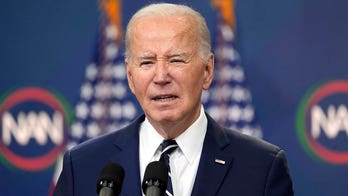President Obama, in a Rose Garden address Monday, called on Senate Republicans to support legislation that would require stricter disclosure by some groups of their campaign finance activities. Republicans, for their part, disagree, long holding that Americans of any stripe should be allowed to give to the candidate of their choice, a move they call an act of free speech.
"We shouldn't be playing these political games," Obama admonished, adding, "A vote to oppose these...reforms is nothing more than a vote to allow corporate interests to take over" elections.
This disagreement will come to a head Tuesday afternoon when the Senate votes on whether or not to start debate on legislation authored by Sen. Charles Schumer, D-NY, dubbed the "DISCLOSE Act," ("Democracy is Strengthened by Casting Light on Spending in Elections" Act).
Schumer told reporters Monday that the vote will be "the true test of so many of our GOP colleagues if they really do believe in a fair process."
But neither the president nor Schumer mentioned a number of Democrats who have voiced strong concern that the legislation exempts certain politically powerful, large membership groups like the NRA, and Schumer conceded that the Democratic caucus is not, at least not yet, unified.
Gun control advocates like Sens. Dianne Feinstein, D-CA, and Frank Lautenberg, D-NJ, blasted the House's legislation that first gave a pass from disclosure to the NRA and other large membership groups, like the AARP, in a move to garner more votes. Schumer retained that exemption.
Schumer's bill requires unions, corporations, and swath nonprofit organizations to disclose their donor lists and include a disclaimer of ownership on any political ads, and the senator said he was trying to convince skeptical senators that they should not "let the perfect be the enemy of the good."
Senate Minority Leader Mitch McConnell, R-KY, a staunch opponent of campaign finance legislation, released a blistering statement from his office on the Tuesday vote, saying, "The mere suggestion that a bill designed to save politicians' jobs should take precedent over helping millions of Americans find work is an embarrassing indictment of Democrats' priorities. The DISCLOSE Act seeks to protect unpopular Democrat politicians by silencing their critics and exempting their campaign supporters from an all out assault on the First Amendment."
But not even those so-called "supporters" like the AFL-CIO are all on board. The union's spokesman, Josh Goldstein, told Fox Monday that though the organization had not yet taken an official position on the Schumer bill, it had concerns.
"Not a definite support/oppose as of now, but based on reports, we are concerned that recent developments could hamper working families' ability to have a voice in the political process," Goldstein e-mailed, adding, "We continue to review the legislation and fight to ensure that the final bill addresses the tilted advantage that big business has enjoyed for far too long."
The Schumer legislation also strictly prohibits any recipient of government assistance under the Troubled Asset Relief Program (TARP) from spending on campaigns or making political contributions until which time the government is repaid its emergency loan.
Supporters of the DISCLOSE Act have tried to woo GOP Sens. Olympia Snowe and Susan Collins of Maine, but Schumer said he was, as yet, coming up short on votes.
One vote he cannot count on is that of Sen. Scott Brown, R-Mass, who, in a mid-July statement, said flatly that the bill "does not do enough to require transparency, accountability and fair play. Therefore, I cannot support the DISCLOSE Act."
When asked why the bill would even be brought up for a vote if it does not yet have the 60 votes required to break a GOP filibuster, Schumer said, simply, "You never know until you call the vote."




